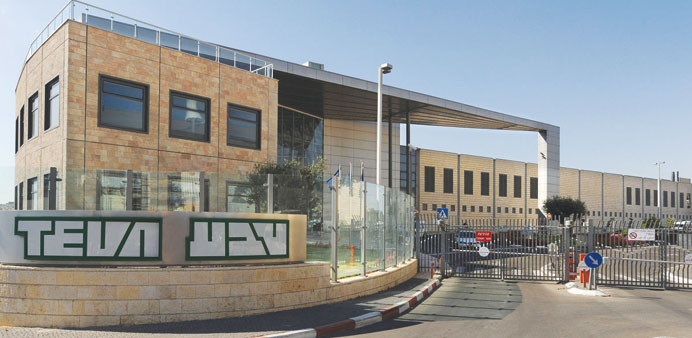The headquarters of Teva Pharmaceutical in Petah Tikva, Israel. The world’s largest maker of generic drugs said yesterday it would buy US neurology drug company Auspex Pharmaceuticals.
Reuters/Tel Aviv
Israel’s Teva Pharmaceutical Industries said it would buy US neurology drug company Auspex Pharmaceuticals for an equity value of $3.5bn to boost its portfolio of treatments for the central nervous system.
Teva, the world’s largest maker of generic drugs, will offer $101 per share in cash, representing a premium of 42.4% to Auspex’s Friday closing price, the companies said yesterday.
In February Teva – Israel’s biggest company by market value and revenue – said it was ready to return to making acquisitions after a year focused on cutting costs under its new chief executive, Erez Vigodman. This is the first major deal for Vigodman, a turnaround specialist brought in last year to reduce costs and improve profit that had been squeezed by rising competition. Teva’s biggest selling drug, multiple sclerosis injectable treatment Copaxone, faces competition from oral treatments and cheaper generics in coming years.
Shares in Auspex were up 41.7% to $100.51 in morning trade, while Teva shares were up 3% at $63.86.
Bernstein analyst Aaron Gal said the acquisition was a good strategic fit for Teva as the company looks to boost growth, and also leaves financial room for a bigger deal in future.
“To the extent Teva would like to make a transformative deal in the generic space, this deal is small enough not to impact that potential,” Gal said.
Auspex’s main product, SD-809, is being developed for the treatment of chorea, abnormal involuntary movement associated with Huntington’s disease, tardive dyskinesia and Tourette syndrome. SD-809 for Huntington’s is expected to win regulatory approval and be launched commercially in 2016, Teva said. An estimated 30,000 people in the US suffer from Huntington’s, 350,000 from tardive dyskinesia and 150,000 from Tourette, for which the drug is in early stage trials. Auspex has another drug being developed for Parkinson’s disease.
Teva said it expected the Auspex deal, which will be financed with cash on hand, to add to revenue from 2016 and to adjusted earnings per share (EPS) beginning in 2017. It will be “meaningfully accretive” thereafter, the company added.
It estimated sales of $2bn from Auspex products in 2020. It expects minimal dilution to adjusted EPS in the second half of 2015 and 2016. Cowen analyst Ken Cacciatore said the acquisition would fit well with Teva’s own neurology commercial and development infrastructure. “The bottom line is that options remain and Teva is now finally on the offence,” he said, adding he hoped even more aggressive deals would be considered.

